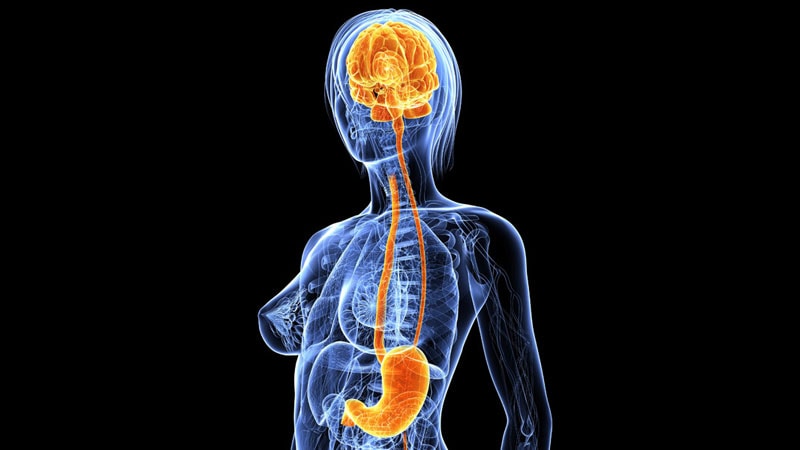Effects of Intermittent Energy Restriction on Brain-Gut-Microbiome Axis in Obesity
Główne pojęcia
Intermittent energy restriction induces significant changes in brain activity and gut microbiome diversity, impacting weight loss in individuals with obesity.
Streszczenie
TOPLINE:
Weight loss through intermittent energy restriction (IER) affects the brain-gut-microbiome (BGM) axis in individuals with obesity.
METHODOLOGY:
Study on 25 obese individuals in China undergoing a three-phase IER intervention.
Phases included normal diet, controlled IER meals, and low-controlled fasting.
Blood and stool samples collected at various time points.
Functional MRI and metagenomic sequencing used for analysis.
TAKEAWAY:
Significant weight loss and improvements in various health markers observed during IER.
Reduction in activity of obesity-related brain regions.
Increased gut microbial diversity and changes in specific bacteria abundances.
Correlation between gut bacteria alterations and brain activity changes.
IN PRACTICE:
IER leads to reductions in eating behavior-related brain regions and changes in gut bacteria abundances.
Dynamic interplay between brain and gut microbiota crucial for weight loss.
SOURCE:
Study led by Jing Zhou from various hospitals in China, published in Frontiers in Cellular and Infection Microbiology.
LIMITATIONS:
Short-term study, no causation established.
Long-term follow-up needed for understanding long-term effects.
DISCLOSURES:
Supported by various Chinese research programs.
Employment disclosures for coauthors.
Intermittent Energy Restriction Tied to Gut, Brain Changes
Statystyki
Patients lost weight (7.6 kg on average).
Significant reductions in body mass index, body fat, blood pressure, and other health markers.
Changes in brain activity observed during IER.
Increase in gut microbial diversity.
Correlation between gut bacteria and brain activity changes.
Cytaty
"IER induced constant, significant reductions in the activity of eating behavior-related brain regions…[and] significant, dynamic changes in the abundance of some gut bacteria."
Kluczowe wnioski z
by Marilynn Lar... o www.medscape.com 01-08-2024
https://www.medscape.com/viewarticle/intermittent-energy-restriction-tied-gut-brain-changes-2024a10000gu
Głębsze pytania
How do the findings of this study impact the treatment of obesity in clinical settings?
The findings of this study suggest that intermittent energy restriction (IER) has significant effects on the brain-gut-microbiome (BGM) axis in individuals with obesity. Understanding the dynamic interplay between the brain and gut microbiota during weight loss can provide valuable insights for developing more effective treatment strategies for obesity in clinical settings. By targeting specific brain regions affecting eating behavior and promoting changes in gut microbial diversity, healthcare professionals may be able to design personalized interventions that facilitate sustainable weight loss and improve metabolic health outcomes in patients with obesity.
What potential challenges or criticisms could arise regarding the methodology of the study?
While the study provides valuable insights into the effects of IER on the BGM axis in individuals with obesity, there are potential challenges and criticisms that could arise regarding the methodology. One limitation is the relatively small sample size of 25 participants, which may limit the generalizability of the findings. Additionally, the study only examined short-term changes in the BGM axis during weight loss, and longer follow-up studies are needed to establish the long-term effects of IER on the brain, gut microbiota, and metabolic health. Furthermore, the study does not establish causation between changes in the gut microbiome and brain activity, leaving room for further research to elucidate the underlying mechanisms driving these dynamic interactions.
How might understanding the brain-gut-microbiome axis influence other areas of health research?
Understanding the intricate relationship between the brain, gut, and microbiome can have far-reaching implications for various areas of health research beyond obesity treatment. The findings of this study highlight the importance of the BGM axis in regulating metabolic processes, immune function, and overall health. By unraveling the complex interactions between the brain, gut microbiota, and various physiological systems, researchers can explore novel therapeutic targets for a wide range of conditions, including metabolic disorders, autoimmune diseases, mental health disorders, and even neurodegenerative diseases. This holistic approach to health research may pave the way for innovative interventions that target the BGM axis to promote overall well-being and prevent disease development.
0
